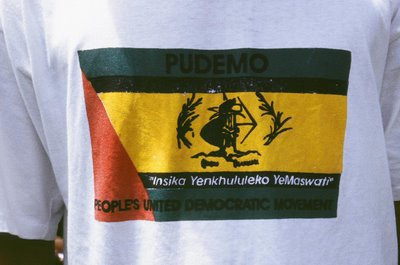PUDEMO International Office
Australia, Asian and the Pacific Region
E-mail: pudemo@yahoo.co.uk
July 12, 2006
Turning a blind eye to history: senior ANC member endorses repression in Swaziland
The July 9, 2006 issue of the Sunday Times (Swaziland) published comments by the former Premier of Mpumalanga Province and current member of the ANC Executive Committee condemning COSATU for leading the boarder blockade against Swaziland. According to the Sunday Times, Mathews Phosa described the blockade as “a disturbance to prosperity and peace”, “unnecessary” and “fruitless efforts of destabilising the country”. Worse, Mr Phosa is reported to have condoned the savage and unprovoked police violence against South African workers during the peaceful boarder blockade.
PUDEMO reiterates its appreciation of COSATU and the people of South Africa for their relentless solidarity with our people. Over the years, our relationship has grown from strength to strength and we ask COSATU and the people of South Africa not to succumb to Mr Phosa’s tantrum. Mr Phosa’s attack is unnecessary, misguided and unhelpful. The blockade was peaceful and there was never an intention on the part of the organisers and participants to disturb the peace. On the contrary, it was part of ongoing commitments by COSATU, SACP and the South African-based Swaziland Solidarity Network (SNS) to the struggle for peaceful political change in Swaziland. It was the South African police that attacked unarmed people as they were staging peaceful protests at the South African and Swaziland border posts. Thus, it was the police and not the protesters that disturbed the peace.
By referring to peace in Swaziland, Mr Phosa, like so many other puppets of the Mswati regime, has invoked what PUDEMO has previously exposed as the travel agent’s myth of a peaceful Swaziland. This myth continues to dominate popular discourses of the country and seeks to portray Swazis as docile and accepting of their fate as virtual slaves of the monarchy. In this image, Swazis are presented as submissive, compliant peasants who do not complain despite the oppression they suffer. In short, they are seen as happy with their lot. The travel agent’s myth may help tourists and multinational companies feel less guilt about their role in maintaining the oppression of Swazis but it is of course a false and harmful image. There has been little peace for the oppressed Swazi population over the generations. There is little peace in the homes of many Swazis now as the population is ravaged by oppression, chronic diseases such as HIV/AIDS, hunger, homelessness, unemployment and poverty and burdened by a corrupt and morally bankrupt dictatorship. Anyone familiar with the history of our liberation movement will know that we do not easily submit intimidation. In recent years, the Commonwealth tried unsuccessfully to intimidate us to accept repression in Swaziland.
Through his comments, Mr Phosa has effectively endorsed the repression in Swaziland and the conditions under which the majority of Swazis have been forced to live. The comments reflect a man who has turned a blind eye not only to his own experience but also to the history of the global anti-apartheid movement. It should be remembered that international economic blockade against the apartheid regime was, undoubtedly, one of the ANC’s most effective strategies of struggle. Even recalcitrant leaders and diehard apartheid supporters such as the former British Prime Minister, Margaret Thatcher could not resist the will of the international community as it used its economic power to bring down the apartheid regime.
Like Phosa, Thatcher described economic sanctions as unnecessary and destabilising. King Sobhuza II, an architect of the repressive system in Swaziland, refused to join the international community. Instead, he invited apartheid capital to invest in Swaziland, yet the ANC-led Government has recently honoured him for fighting apartheid. King Sobhuza II’s son and successor, King Mswati III, followed in his father’s footsteps and dined with the devil at the time when the ANC was intensifying its economic blockade campaign.
It is extremely unfortunate that a senior ANC member has chosen to echo ideas of a diehard supporter of apartheid and to provide solace to a repressive regime.
There seems to be a trend for former South African political leaders to assist the repressive regime in Swaziland. A day before the Sunday Times (Swaziland) published Mr Phosa’s comments, the Swazi News (July 8, 2006) reported on the new role of former apartheid President, F.W. de Klerk, as political advisor to King Mswati III. Is this a consolidated resistance against the struggle for democracy in Swaziland by two former foes who have come together to give a helping hand to Africa’s last absolute monarchy? These developments are indeed disturbing to the pro-democracy movement in Swaziland. We ask Mr Phosa and Mr F.W. de Klerk to reconsider their positions and not to put their personal interests before the lives of more than a million people who have already suffered too much under this regime.
Signed:
Dr Matsebula
PUDEMO Representative
Australia, Asia and the Pacific Region

No comments:
Post a Comment